These highlights do not include all the information needed to use SYMJEPI® safely and effectively. See full prescribing information for SYMJEPI®. SYMJEPI® (epinephrine) injection, for intramuscular or subcutaneous use Initial U.S. Approval: 1939
Symjepi by
Drug Labeling and Warnings
Symjepi by is a Prescription medication manufactured, distributed, or labeled by USWM, LLC, Catalent Belgium S.A., SGS Lab Simon, Phillips Medisize LLC, Cambrex Profarmaco Milano S.r.l.. Drug facts, warnings, and ingredients follow.
Drug Details [pdf]
SYMJEPI- epinephrine injection, solution
USWM, LLC
----------
HIGHLIGHTS OF PRESCRIBING INFORMATIONThese highlights do not include all the information needed to use SYMJEPI® safely and effectively. See full prescribing information for SYMJEPI®.
SYMJEPI® (epinephrine) injection, for intramuscular or subcutaneous use Initial U.S. Approval: 1939 INDICATIONS AND USAGESYMJEPI is a non-selective alpha and beta-adrenergic receptor agonist, indicated in the emergency treatment of allergic reactions (Type I) including anaphylaxis. (1) DOSAGE AND ADMINISTRATIONDOSAGE FORMS AND STRENGTHSCONTRAINDICATIONSNone. (4) WARNINGS AND PRECAUTIONS
ADVERSE REACTIONS
To report SUSPECTED ADVERSE REACTIONS, contact Adamis Pharmaceuticals Corporation at 1-800-230-3935 or FDA at 1-800-FDA-1088 or www.fda.gov/medwatch. DRUG INTERACTIONS
USE IN SPECIFIC POPULATIONSSee 17 for PATIENT COUNSELING INFORMATION and FDA-approved patient labeling. Revised: 7/2021 |
FULL PRESCRIBING INFORMATION
1 INDICATIONS AND USAGE
SYMJEPI is indicated in the emergency treatment of allergic reactions (Type I) including anaphylaxis to stinging insects (e.g., order Hymenoptera, which include bees, wasps, hornets, yellow jackets and fire ants) and biting insects (e.g., triatoma, mosquitoes), allergen immunotherapy, foods, drugs, diagnostic testing substances (e.g., radiocontrast media) and other allergens, as well as idiopathic anaphylaxis or exercise-induced anaphylaxis.
SYMJEPI is intended for immediate administration in patients who are determined to be at increased risk for anaphylaxis, including individuals with a history of anaphylactic reactions.
Anaphylactic reactions may occur within minutes after exposure and consist of flushing, apprehension, syncope, tachycardia, thready or unobtainable pulse associated with a fall in blood pressure, convulsions, vomiting, diarrhea and abdominal cramps, involuntary voiding, wheezing, dyspnea due to laryngeal spasm, pruritus, rashes, urticaria or angioedema.
SYMJEPI is intended for immediate administration as emergency supportive therapy only and is not a substitute for immediate medical care.
2 DOSAGE AND ADMINISTRATION
2.1 Recommended Dosage According to Patient Body Weight
- Patients greater than or equal to 30 kg (approximately 66 pounds or more): 0.3 mg
- Patients 15 kg to 30 kg (33 pounds to 66 pounds): 0.15 mg.
2.2 Administration Instructions
- Inject the single-dose SYMJEPI intramuscularly or subcutaneously into the anterolateral aspect of the thigh with the needle facing downwards. It can be injected through clothing if necessary. Do not inject intravenously, and do not inject into buttocks, into digits, hands and feet [see Warnings and Precautions (5.2)].
- Instruct caregivers of young children who are prescribed SYMJEPI and who may be uncooperative and kick or move during an injection to hold the leg firmly in place and limit movement prior to and during an injection [see Warnings and Precautions (5.2)].
- Each SYMJEPI is a single dose of epinephrine injection for single use. Since the doses of epinephrine delivered from SYMJEPI are fixed, consider using other forms of injectable epinephrine if doses lower than 0.15 mg are deemed necessary.
- With severe persistent anaphylaxis, repeat injections with an additional SYMJEPI may be necessary. More than two sequential doses of epinephrine should only be administered under direct medical supervision [see Warnings and Precautions (5.1)].
- Ensure that the patient or caregiver is instructed and understands the indications and use of this product. A health care provider should review the patient instructions for SYMJEPI, in detail, with the patient or caregiver. Patients and/or any other person who might be in a position to administer an epinephrine injection should be advised of the proper site for injection and given appropriate instructions about imbedding the needle before transferring the thumb to the syringe plunger [see Instructions for Use].
- The epinephrine solution in the syringe should be inspected visually for particulate matter and discoloration.
3 DOSAGE FORMS AND STRENGTHS
- Injection: 0.3 mg (0.3 mg/0.3 mL), clear and colorless solution in single-dose, pre-filled syringe for manual injection
- Injection: 0.15 mg (0.15 mg/0.3 mL), clear and colorless solution in single-dose, pre-filled syringe for manual injection
5 WARNINGS AND PRECAUTIONS
5.1 Emergency Treatment
SYMJEPI is intended for immediate administration as emergency supportive therapy and is not intended as a substitute for immediate medical care. In conjunction with the administration of epinephrine, the patient should seek immediate medical or hospital care. More than two sequential doses of epinephrine should only be administered under direct medical supervision [see Indications and Usage (1), Dosage and Administration (2), Patient Counseling Information (17)].
5.2 Injection-related Complications
SYMJEPI should only be injected into the anterolateral aspect of the thigh [see Dosage and Administration (2.2), Patient Counseling Information (17)].
Do not inject intravenously
Large doses or accidental intravenous injection of epinephrine may result in cerebral hemorrhage due to sharp rise in blood pressure. Rapidly acting vasodilators can counteract the marked pressor effects of epinephrine if there is such inadvertent administration.
Do not inject into buttock
Injection into the buttock may not provide effective treatment of anaphylaxis. Advise the patient to go immediately to the nearest emergency room for further treatment of anaphylaxis. Additionally, injection into the buttock has been associated with gas gangrene. Cleansing with alcohol does not kill bacterial spores and therefore, does not lower the risk.
Do not inject into digits, hands or feet
Since epinephrine is a strong vasoconstrictor, accidental injection into the digits, hands or feet may result in loss of blood flow to the affected area. Advise the patient to go immediately to the nearest emergency room and to inform the healthcare provider in the emergency room of the location of the accidental injection. Treatment of such inadvertent administration should consist of vasodilation, in addition to further appropriate treatment of anaphylaxis [see Adverse Reactions (6)].
5.3 Serious Infections at the Injection Site
Rare cases of serious skin and soft tissue infections, including necrotizing fasciitis and myonecrosis caused by Clostridia (gas gangrene), have been reported at the injection site following epinephrine injection for anaphylaxis. Clostridium spores can be present on the skin and introduced into the deep tissue with subcutaneous or intramuscular injection. While cleansing with alcohol may reduce presence of bacteria on the skin, alcohol cleansing does not kill Clostridium spores. To decrease the risk of Clostridium infection, do not inject SYMJEPI into the buttock [see Warnings and Precautions (5.2)]. Advise patients to seek medical care if they develop signs or symptoms of infection, such as persistent redness, warmth, swelling, or tenderness, at the epinephrine injection site.
5.4 Allergic Reactions Associated with Sulfite
The presence of a sulfite in this product should not deter administration of the drug for the treatment of serious allergic or other emergency situations even if the patient is sulfite-sensitive.
Epinephrine is the preferred treatment for serious allergic reactions or other emergency situations even though this product contains sodium metabisulfite, a sulfite that may, in other products, cause allergic-type reactions including anaphylactic symptoms or life threatening or less severe asthmatic episodes in certain susceptible persons.
The alternatives to using epinephrine in a life-threatening situation may not be satisfactory.
5.5 Disease Interactions
Some patients may be at greater risk for developing adverse reactions after epinephrine administration. Despite these concerns, it should be recognized that the presence of these conditions is not a contraindication to epinephrine administration in an acute, life-threatening situation. Therefore, patients with these conditions, and/or any other person who might be in a position to administer SYMJEPI to a patient experiencing anaphylaxis should be carefully instructed in regard to the circumstances under which epinephrine should be used.
Patients with Heart Disease
Epinephrine should be administered with caution to patients who have heart disease, including patients with cardiac arrhythmias, coronary artery or organic heart disease, or hypertension. In such patients, or in patients who are on drugs that may sensitize the heart to arrhythmias, epinephrine may precipitate or aggravate angina pectoris as well as produce ventricular arrhythmias [see Drug Interactions (7), Adverse Reactions (6)].
Other Patients and Diseases
Epinephrine should be administered with caution to patients with hyperthyroidism, diabetes, elderly individuals, and pregnant women. Patients with Parkinson's disease may notice a temporary worsening of symptoms.
6 ADVERSE REACTIONS
Due to the lack of randomized, controlled clinical trials of epinephrine for the treatment of anaphylaxis, the true incidence of adverse reactions associated with the systemic use of epinephrine is difficult to determine. Adverse reactions reported in observational trials, case reports and studies are listed below.
Common adverse reactions to systemically administered epinephrine include: anxiety; apprehensiveness; restlessness; tremor; weakness; dizziness; sweating; palpitations; pallor; nausea and vomiting; headache; and/or respiratory difficulties. These symptoms occur in some persons receiving therapeutic doses of epinephrine, but are more likely to occur in patients with hypertension or hyperthyroidism [see Warnings and Precautions (5.5)].
Cardiovascular Reactions
- Arrhythmias, including fatal ventricular fibrillation, have been reported, particularly in patients with underlying cardiac disease or those receiving certain drugs [see Warnings and Precautions (5.5), Drug Interactions (7)].
- Rapid rises in blood pressure have produced cerebral hemorrhage, particularly in elderly patients with cardiovascular disease [see Warnings and Precautions (5.5)].
- Angina may occur in patients with coronary artery disease [see Warnings and Precautions (5.5)].
- Rare cases of stress cardiomyopathy have been reported in patients treated with epinephrine.
Reactions from Accidental Injection and/or Improper Technique
- Accidental injection into the digits, hands or feet may result in loss of blood flow to the affected area [see Warnings and Precautions (5.2)].
- Adverse events experienced as a result of accidental injections may include increased heart rate, local reactions including injection site pallor, coldness and hypoesthesia or injury at the injection site resulting in bruising, bleeding, discoloration, erythema or skeletal injury.
- Injection into the buttock has resulted in cases of gas gangrene [see Warnings and Precautions (5.2)].
Skin and Soft Tissue Infections
- Rare cases of serious skin and soft tissue infections, including necrotizing fasciitis and myonecrosis caused by Clostridia (gas gangrene), have been reported at the injection site following epinephrine injection in the thigh [see Warnings and Precautions (5.2)].
7 DRUG INTERACTIONS
Cardiac Glycosides, Diuretics, and Anti-arrhythmics
Patients who receive epinephrine while concomitantly taking cardiac glycosides, diuretics, or anti-arrhythmics should be observed carefully for the development of cardiac arrhythmias [see Warnings and Precautions (5.4)].
Antidepressants, Monoamine Oxidase Inhibitors, Levothyroxine, and Antihistamines
The effects of epinephrine may be potentiated by tricyclic antidepressants, monoamine oxidase inhibitors, levothyroxine sodium, and certain antihistamines, notably chlorpheniramine, tripelennamine, and diphenhydramine.
Beta-Adrenergic Blockers
The cardiostimulating and bronchodilating effects of epinephrine are antagonized by beta-adrenergic blocking drugs, such as propranolol.
8 USE IN SPECIFIC POPULATIONS
8.1 Pregnancy
Risk Summary
There are no adequate and well controlled studies of the acute effect of epinephrine in pregnant women. In animal reproductive studies, epinephrine administered by the subcutaneous route to rabbits, mice, and hamsters during the period of organogenesis was teratogenic at doses 7 times and higher than the maximum recommended human intramuscular and subcutaneous dose on a mg/m2 basis. Epinephrine is the first-line medication of choice for the treatment of anaphylaxis during pregnancy in humans. Epinephrine should be used for treatment of anaphylaxis during pregnancy in the same manner as it is used in non-pregnant patients.
In the U.S. general population, the estimated background risks of major birth defects and miscarriage in clinically recognized pregnancies is 2% to 4% and of miscarriage is 15% to 20%, respectively.
Clinical Considerations
Disease-associated maternal and embryo/fetal risk:
During pregnancy, anaphylaxis can be catastrophic and can lead to hypoxic-ischemic encephalopathy and permanent central nervous system damage or death in the mother and, more commonly, in the fetus or neonate. The prevalence of anaphylaxis occurring during pregnancy is reported to be approximately 3 cases per 100,000 deliveries.
Management of anaphylaxis during pregnancy is similar to management in the general population. Epinephrine is the first-line medication of choice for treatment of anaphylaxis; it should be used in the same manner in pregnant and non-pregnant patients. In conjunction with the administration of epinephrine, the patient should seek immediate medical or hospital care.
Data
Animal Data
In an embryofetal development study with rabbits dosed during the period of organogenesis, epinephrine was shown to be teratogenic (including gastroschisis and embryonic lethality) at doses approximately 40 times the maximum recommended intramuscular or subcutaneous dose (on a mg/m2 basis at a maternal subcutaneous dose of 1.2 mg/kg/day for two to three days).
In an embryofetal development study with mice dosed during the period of organogenesis, epinephrine was shown to be teratogenic (including embryonic lethality) at doses approximately 8 times the maximum recommended intramuscular or subcutaneous dose (on a mg/m2 basis at maternal subcutaneous dose of 1 mg/kg/day for 10 days). These effects were not seen in mice at approximately 4 times the maximum recommended daily intramuscular or subcutaneous dose (on a mg/m2 basis at a subcutaneous maternal dose of 0.5 mg/kg/day for 10 days).
In an embryofetal development study with hamsters dosed during the period of organogenesis from gestation days 7 to 10, epinephrine was shown to be teratogenic at doses approximately 7 times the maximum recommended intramuscular or subcutaneous dose (on a mg/m2 basis at a maternal subcutaneous dose of 0.5 mg/kg/day).
8.2 Lactation
Risk Summary
There is no information regarding the presence of epinephrine in human milk, the effects on breastfed infants, or the effects on milk production. Epinephrine is the first-line medication of choice for treatment of anaphylaxis; it should be used in the same manner in breastfeeding and non-breastfeeding patients.
8.4 Pediatric Use
SYMJEPI may be given safely to pediatric patients at a dosage appropriate to body weight [see Dosage and Administration (2.1)]. Clinical experience with the use of epinephrine suggests that the adverse reactions seen in children are similar in nature and extent to those both expected and reported in adults. Since the dose of epinephrine delivered from SYMJEPI is fixed, consider using other forms of injectable epinephrine if a dose lower than 0.15mg is deemed necessary.
8.5 Geriatric Use
Clinical studies for the treatment of anaphylaxis have not been performed in subjects aged 65 and over to determine whether they respond differently from younger subjects. However, other reported clinical experience with use of epinephrine for the treatment of anaphylaxis has identified that geriatric patients may be particularly sensitive to the effects of epinephrine. Therefore, SYMJEPI should be administered with caution in elderly individuals, who may be at greater risk for developing adverse reactions after epinephrine administration. [see Warnings and Precautions (5.4), Overdosage (10)].
10 OVERDOSAGE
Overdosage of epinephrine may produce extremely elevated arterial pressure, which may result in cerebrovascular hemorrhage, particularly in elderly patients. Overdosage may also result in pulmonary edema because of peripheral vascular constriction together with cardiac stimulation. Treatment consists of rapidly acting vasodilators or alpha-adrenergic blocking drugs and/or respiratory support.
Epinephrine overdosage can also cause transient bradycardia followed by tachycardia, and these may be accompanied by potentially fatal cardiac arrhythmias. Premature ventricular contractions may appear within one minute after injection and may be followed by multifocal ventricular tachycardia (prefibrillation rhythm). Subsidence of the ventricular effects may be followed by atrial tachycardia and occasionally by atrioventricular block. Treatment of arrhythmias consists of administration of a beta-adrenergic blocking drug such as propranolol.
Overdosage sometimes results in extreme pallor and coldness of the skin, metabolic acidosis, and kidney failure. Suitable corrective measures must be taken in such situations.
11 DESCRIPTION
Each SYMJEPI 0.3 mg pre-filled syringe delivers a single dose of 0.3 mg of epinephrine from epinephrine injection, USP (0.3mg/0.3 mL).
Each SYMJEPI 0.15 mg pre-filled syringe delivers a single dose of 0.15 mg of epinephrine from epinephrine injection, USP (0.15 mg/0.3 mL).
Each SYMJEPI (epinephrine injection, USP) syringe contains 0.8 mL of sterile aqueous solution of epinephrine for intramuscular or subcutaneous administration. The syringe is overfilled for stability purposes: more than half of the solution remains in the syringe after use and CANNOT BE REUSED.
Each 0.3 mL of SYMJEPI 0.3 mg contains 0.3 mg epinephrine, 1.8 mg sodium chloride, 0.5 mg sodium metabisulfite, hydrochloric acid to adjust pH, and Water for Injection. The pH range is 2.2-5.0.
Each 0.3 mL of SYMJEPI 0.15 mg contains 0.15 mg epinephrine, 1.8 mg sodium chloride, 0.3 mg sodium metabisulfite, hydrochloric acid to adjust pH, and Water for Injection. The pH range is 2.2-5.0.
Epinephrine is a sympathomimetic catecholamine (a non-selective alpha and beta-adrenergic receptor agonist) designated chemically as (-)-3,4-Dihydroxy-α-[(methylamino)methyl]benzyl alcohol and has the following structure:

The molecular weight of epinephrine is 183.20.
Epinephrine solution deteriorates rapidly on exposure to air or light, turning pink from oxidation to adrenochrome and brown from formation of melanin. Replace SYMJEPI if the solution appears discolored (pinkish or brown color), cloudy or contains particles.
12 CLINICAL PHARMACOLOGY
12.2 Pharmacodynamics
Through its action on alpha-adrenergic receptors, epinephrine lessens the vasodilation and increased vascular permeability that occurs during anaphylaxis, which can lead to loss of intravascular fluid volume and hypotension.
Through its action on beta-adrenergic receptors, epinephrine causes bronchial smooth muscle relaxation and helps alleviate bronchospasm, wheezing and dyspnea that may occur during anaphylaxis.
Epinephrine also alleviates pruritus, urticaria, and angioedema and may relieve gastrointestinal and genitourinary symptoms associated with anaphylaxis because of its relaxer effects on the smooth muscle of the stomach, intestine, uterus and urinary bladder.
When given subcutaneously or intramuscularly, epinephrine has a rapid onset and short duration of action.
13 NONCLINICAL TOXICOLOGY
13.1 Carcinogenesis, Mutagenesis, Impairment of Fertility
Long-term studies to evaluate the carcinogenic potential of epinephrine have not been conducted.
Epinephrine and other catecholamines have been shown to have mutagenic potential in vitro. Epinephrine was positive in the Salmonella bacterial reverse mutation assay, positive in the mouse lymphoma assay, and negative in the in vivo micronucleus assay. Epinephrine is an oxidative mutagen based on the E. coli WP2 Mutoxitest bacterial reverse mutation assay. This should not prevent the use of epinephrine under the conditions noted under Indications and Usage (1).
The potential for epinephrine to impair reproductive performance has not been evaluated, but epinephrine has been shown to decrease implantation in female rabbits dosed subcutaneously with 1.2 mg/kg/day (40-fold the highest human intramuscular or subcutaneous daily dose) during gestation days 3 to 9.
16 HOW SUPPLIED/STORAGE AND HANDLING
How Supplied
SYMJEPI (epinephrine injection, USP) 0.3 mg single-dose, pre-filled syringes:
- One-pack carton (NDC: 78670-130-11) that contains one 0.3 mg pre-filled syringe (NDC: 78670-130-11).
- Two-pack carton (NDC: 78670-130-02) that contains two 0.3 mg pre-filled syringes (NDC: 78670-130-11)
SYMJEPI (epinephrine injection, USP) 0.15 mg single-dose, pre-filled syringes:
- One-pack carton (NDC: 78670-131-11) that contains one 0.15 mg pre-filled syringe (NDC: 78670-131-11).
- Two-pack carton (NDC: 78670-131-02) that contains two 0.15 mg pre-filled syringes (NDC: 78670-131-11).
Storage and Handling
Protect from light. Epinephrine is light sensitive and should be stored in the case provided to protect it from light. Store at 20°C to 25°C (68°F to 77°F); excursions permitted to 15°C to 30°C (59°F to 86°F) [see USP Controlled Room Temperature]. Do not refrigerate. Before using, check to make sure the solution in the syringe is clear and colorless. Replace the product if the solution is discolored (pinkish or brown color), cloudy or contains particles. Used SYMJEPI should be given to a healthcare provider or emergency room personnel for proper disposal. Expired or discolored SYMJEPI should be returned to a healthcare provider or pharmacy for proper disposal.
17 PATIENT COUNSELING INFORMATION
Advise the patient to read the FDA-approved patient labeling (Patient Information and Instructions for Use).
A healthcare provider should review the patient instructions and operation of SYMJEPI, in detail, with the patient or caregiver.
Epinephrine is essential for the treatment of anaphylaxis. Patients who are at risk of or have a history of severe allergic reactions (anaphylaxis) to insect stings or bites, foods, drugs, and other allergens, as well as idiopathic and exercise-induced anaphylaxis, should be carefully instructed about the circumstances under which epinephrine should be used.
Administration and Training
Instruct patients and/or caregivers in the appropriate use of SYMJEPI. SYMJEPI should be injected into the middle of the outer thigh (through clothing, if necessary). Each syringe is for a single-use injection. Advise patients to seek immediate medical care in conjunction with administration of SYMJEPI.
Young children may be uncooperative and kick or move during an injection. Instruct caregivers of young children who are prescribed SYMJEPI to hold leg firmly in place and limit movement prior to and during an injection [see Warnings and Precautions (5.2)].
Complete patient information, including dosage, directions for proper administration and precautions can be found inside each SYMJEPI carton. A printed label on the surface of the SYMJEPI case shows instructions for use.
Adverse Reactions
Epinephrine may produce symptoms and signs that include an increase in heart rate, the sensation of a more forceful heartbeat, palpitations, sweating, nausea and vomiting, difficulty breathing, pallor, dizziness, weakness or shakiness, headache, apprehension, nervousness, or anxiety. These signs and symptoms usually subside rapidly, especially with rest, quiet and recumbency. Patients with hypertension or hyperthyroidism may develop more severe or persistent effects, and patients with coronary artery disease could experience angina. Patients with diabetes may develop increased blood glucose levels following epinephrine administration. Patients with Parkinson's disease may notice a temporary worsening of symptoms. [see Warnings and Precautions (5.4)].
Accidental Injection
Advise patients to seek immediate medical care in the case of accidental injection. Since epinephrine is a strong vasoconstrictor when injected into the digits, hands, or feet, treatment should be directed at vasodilatation if there is such an accidental injection to these areas [see Warnings and Precautions (5.2)].
Serious Infections at the Injection Site
Rare cases of serious skin and soft tissue infections, including necrotizing fasciitis and myonecrosis caused by Clostridia (gas gangrene), have been reported at the injection site following epinephrine injection for anaphylaxis. Advise patients to seek medical care if they develop signs or symptoms of infection, such as persistent redness, warmth, swelling, or tenderness, at the epinephrine injection site [see Warnings and Precautions (5.3)].
Storage and Handling
Instruct patients to inspect the epinephrine solution visually periodically. SYMJEPI should be replaced if the epinephrine solution appears discolored (pinkish or brown color), cloudy or contains particles. Epinephrine is light sensitive and should be stored in the outer case provided to protect it from light. Instruct patients that SYMJEPI must be used or properly disposed once the protective cap covering the needle is removed [see How Supplied/Storage and Handling (16.2)]. Instruct patients to give a used SYMJEPI syringe to their healthcare provider or emergency room personnel for proper disposal, and to return expired or discolored SYMJEPI to their healthcare provider or pharmacy for proper disposal.
Complete patient information, including dosage, directions for proper administration and precautions can be found inside each SYMJEPI case.
SYMJEPI is a registered trademark of Adamis Pharmaceuticals Corporation.
Manufactured for Adamis Pharmaceuticals Corp., San Diego, CA 92130
Distributed by USWM, LLC, Louisville, KY 40241.
| This Patient Information has been approved by the U.S. Food and Drug Administration | Revised: 07/2021 | |||
| PATIENT INFORMATION
SYMJEPI (sim-JEP-ee) (epinephrine) injection, for intramuscular or subcutaneous use For Allergic Emergencies (anaphylaxis) |
||||
| Read this Patient Information leaflet carefully before using SYMJEPI and each time you get a refill. There may be new information. You, your parent, caregiver or others who may be in a position to administer SYMJEPI should know how to use it before you have an allergic emergency. This information does not take the place of talking with your healthcare provider about your medical condition or your treatment. | ||||
| What is the most important information I should know about SYMJEPI? | ||||
|
Symptoms of anaphylaxis may include: |
||||
|
|
|||
|
Talk to your healthcare provider if you need additional pre-filled syringes to keep at work, school, or other locations. Tell your family members, caregivers, and others where you keep your SYMJEPI and how to use it before you need it. You may be unable to speak in an allergic emergency.
|
||||
| What is SYMJEPI? | ||||
|
||||
| Before using SYMJEPI, tell your healthcare provider about all of your medical conditions, including if you: | ||||
|
||||
| Tell your healthcare provider about all the medicines you take, including prescription and over-the-counter medicines, vitamins and herbal supplements. Tell your healthcare provider of all known allergies. | ||||
| Especially tell your healthcare provider if you take certain asthma medicines. | ||||
| SYMJEPI and other medicines may affect each other, causing side effects. SYMJEPI may affect the way other medicines work, and other medicines may affect how SYMJEPI works. | ||||
| Know the medicines you take. Keep a list of them to show your healthcare provider and pharmacist when you get a new medicine. | ||||
| Use your SYMJEPI for treatment of anaphylaxis as prescribed by your healthcare provider, regardless of your medical conditions or the medicines you take. | ||||
| How should I use SYMJEPI? | ||||
|
||||
| What are the possible side effects of SYMJEPI? | ||||
| SYMJEPI may cause serious side effects. | ||||
|
||||
|
|
|
||
| If you accidentally inject SYMJEPI into any other part of your body, go to the nearest emergency room right away. Tell the healthcare provider where on your body you received the accidental injection. | ||||
|
||||
|
|
|||
|
||||
| Common side effects of SYMJEPI include: | ||||
|
|
|||
| These side effects may go away with rest. Tell your healthcare provider if you have any side effect that bothers you or that does not go away. | ||||
| These are not all the possible side effects of SYMJEPI. For more information, ask your healthcare provider or pharmacist. | ||||
| Call your doctor for medical advice about side effects. You may report side effects to FDA at 1-800-FDA-1088 | ||||
| How should I store SYMJEPI? | ||||
|
||||
| Keep SYMJEPI and all medicines out of the reach of children. | ||||
| General information about the safe and effective use of SYMJEPI. | ||||
| Medicines are sometimes prescribed for purposes other than those listed in a Patient Information leaflet. Do not use SYMJEPI for a condition for which it was not prescribed. Do not give your SYMJEPI to other people. | ||||
| This Patient Information leaflet summarizes the most important information about SYMJEPI. If you would like more information, talk to your healthcare provider. You can ask your pharmacist or healthcare provider for information about SYMJEPI that is written for health professionals. | ||||
| What are the ingredients in SYMJEPI? | ||||
| Active Ingredients: epinephrine | ||||
| Inactive Ingredients: hydrochloric acid, sodium chloride, sodium metabisulfite and water. | ||||
| Manufactured for Adamis Pharmaceuticals Corp. San Diego, CA 92130 Distributed by USWM, LLC, Louisville, KY 40241 |
||||
| SYMJEPI is a registered trademark of Adamis Pharmaceuticals Corporation. | ||||
| For more information and instructions on the use of SYMJEPI, go to www.symjepi.com or call 1-800-230-3935. | ||||
| Important Information | ||||
|
||||
Instructions for Use
SYMJEPI (sim-JEP-ee) (epinephrine injection, USP) pre-filled syringe
For Allergic Emergencies (anaphylaxis)
Read this Instructions for Use carefully before you use this product.
Before you need to use your SYMJEPI syringe, make sure your healthcare provider shows you the right way to use it. Parents, caregivers, and others who may be in a position to administer SYMJEPI should also understand how to use it. If you have questions, ask your healthcare provider.
Get Ready to Use SYMJEPI
SYMJEPI works like a standard pre-filled syringe.

SYMJEPI is injected downwards, into the thigh, while sitting (as shown), through clothing if necessary.
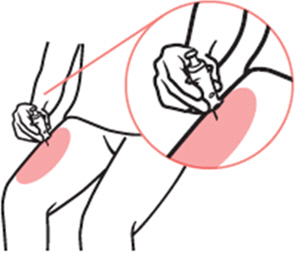
Ready to Use SYMJEPI
|
|
|
| When ready to inject, pull off cap to expose needle. | Do not put finger on top of the device.
If you are administering SYMJEPI to a young child, hold the leg firmly in place while administering the injection. Hold SYMJEPI by finger grips only and slowly insert the needle into the thigh. |
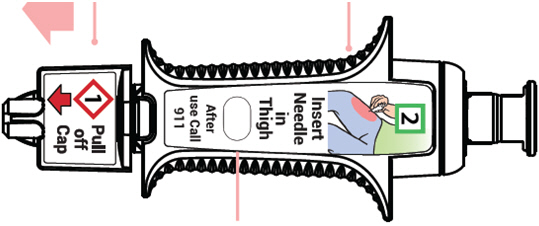
Solution window

After needle is in thigh: Push the plunger all the way down until it clicks and hold for 2 seconds.
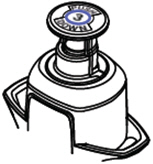
Remove the syringe and massage the injection area for 10 seconds.
Get Help
Get emergency medical help now.

Tell healthcare provider that you received an injection of epinephrine.
Use second syringe if necessary
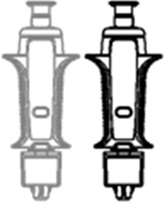
You may need a second SYMJEPI syringe if symptoms continue or recur.
SYMJEPI is a single use pre-filled syringe that delivers a fixed dose of epinephrine. The pre-filled syringe cannot be reused. It is normal for most of the medicine to remain in the syringe after the dose has been injected.
The correct dose has been injected if the plunger has been pushed all the way down and the solution window is at least partially blocked.
If you will be administering SYMJEPI to a young child, ask your healthcare provider to show you how to properly hold the leg in place while administering a dose.
After use and Disposal - Hold SYMJEPI with one hand with your fingers behind the needle and slide the safety guard over the needle until it clicks. Put the used syringe into the grey case and close the case.
- Take the case with the used syringe with you when you go to see a healthcare provider.
- Tell the healthcare provider that you have received an injection of epinephrine. Show the healthcare provider where you received the injection.
- Give your used SYMJEPI syringe to your healthcare provider for inspection and proper disposal.
After Use
Safety Guard
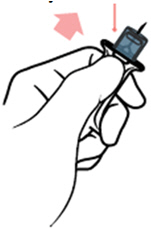
Using one hand with fingers behind the needle slide safety guard over needle.
For more information see Patient Information sheet or ask your healthcare provider.
How to Store - Keep SYMJEPI in its plastic case nearby and ready for use at all times.
- Store at room temperature between 68°F to 77°F (20°C to 25°C). Do not expose to extreme cold or heat. For example, do not store in your vehicle's glove box and do not store in the refrigerator or freezer.
- Store the SYMJEPI syringe in its closed plastic case to protect from light.
Check Your SYMJEPI Periodically - The solution should be clear when viewed through the window on the device. If the solution is discolored (pinkish or brown color), cloudy or contains particles, replace the SYMJEPI with a new one.
Your SYMJEPI Has an Expiration Date - Example 2021 12 = December 31, 2021. Replace SYMJEPI before the expiration date. Dispose of expired SYMJEPI properly by taking the SYMJEPI in its case to a healthcare provider or hospital emergency room.
For more information about SYMJEPI pre-filled syringe and proper use of the product, call 1-800-230-3935 or visit www.symjepi.com.
SYMJEPI is a registered trademark of Adamis Pharmaceuticals Corporation.
Manufactured for Adamis Pharmaceuticals Corporation.
San Diego, CA 92130
Distributed by USWM, LLC, Louisville, KY 40241.
This Instructions for Use has been approved by the U.S. Food and Drug Administration.
Revised: July 2021
SYMJEPI
(epinephrine injection, USP) pre-filled syringe
Instructions for Use
Pull out and Read before Use
Rx Only
2D barcode
PRINCIPAL DISPLAY PANEL - 0.3 mg Syringe Carton
NDC: 78670-130-02
Rx Only
SYMJEPI®
(epinephrine injection, USP) 0.3 mg
(0.3 mg/0.3 mL)
FOR INTRAMUSCULAR AND SUBCUTANEOUS USE
For Allergic Emergencies (anaphylaxis)
Contains Two Syringes –
(0.3 mg Pre-Filled Single-Dose Syringes)
US WorldMeds®
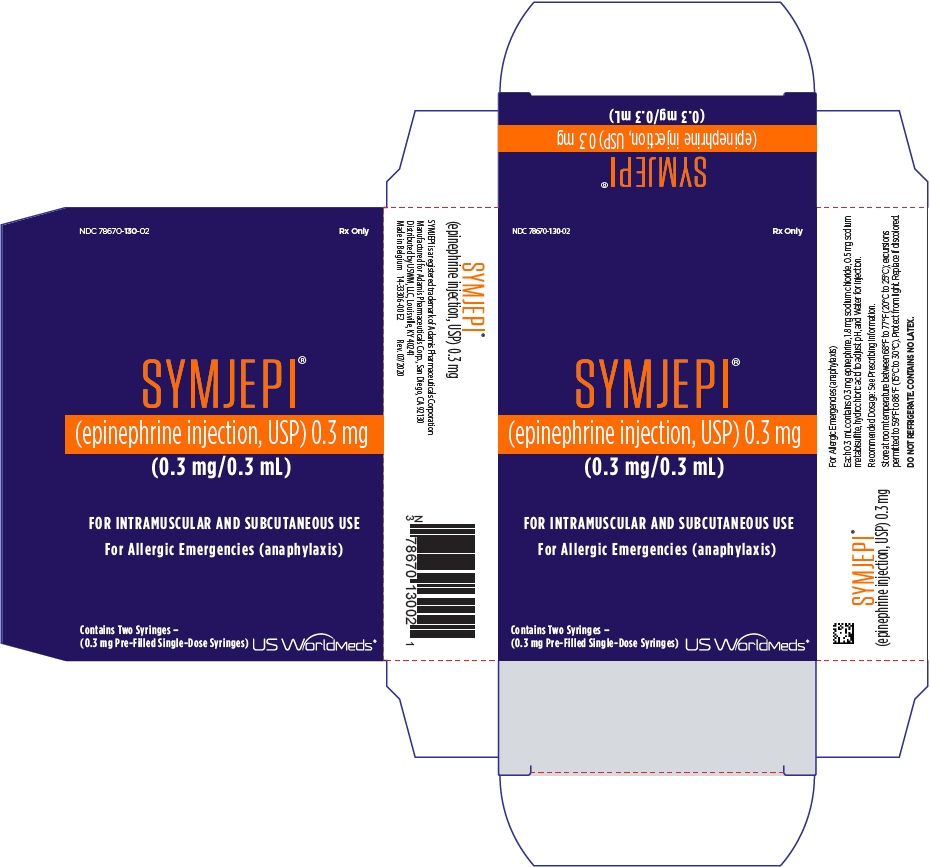
PRINCIPAL DISPLAY PANEL - 0.15 mg Syringe Carton
NDC: 78670-131-02
Rx Only
SYMJEPI®
(epinephrine injection, USP) 0.15 mg
(0.15 mg/0.3 mL)
FOR INTRAMUSCULAR AND SUBCUTANEOUS USE
For Allergic Emergencies (anaphylaxis)
Contains Two Syringes –
(0.15 mg Pre-Filled Single-Dose Syringes)
US WorldMeds®
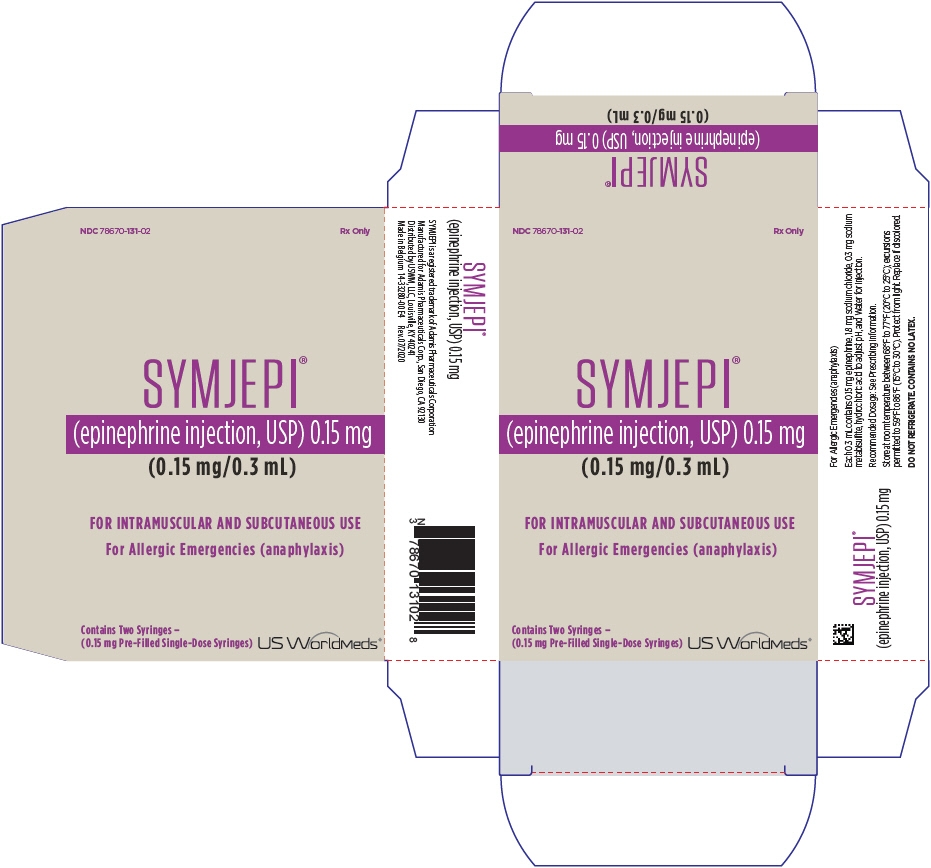
| SYMJEPI
epinephrine injection, solution |
||||||||||||||||||||
|
||||||||||||||||||||
|
||||||||||||||||||||
|
||||||||||||||||||||
|
||||||||||||||||||||
|
||||||||||||||||||||
| SYMJEPI
epinephrine injection, solution |
||||||||||||||||||||
|
||||||||||||||||||||
|
||||||||||||||||||||
|
||||||||||||||||||||
|
||||||||||||||||||||
|
||||||||||||||||||||
| Labeler - USWM, LLC (117542566) |
| Establishment | |||
| Name | Address | ID/FEI | Business Operations |
|---|---|---|---|
| Catalent Belgium S.A. | 370696762 | MANUFACTURE(78670-130, 78670-131) , ANALYSIS(78670-130, 78670-131) | |
| Establishment | |||
| Name | Address | ID/FEI | Business Operations |
|---|---|---|---|
| SGS Lab Simon | 283063907 | ANALYSIS(78670-130, 78670-131) | |
| Establishment | |||
| Name | Address | ID/FEI | Business Operations |
|---|---|---|---|
| Phillips Medisize LLC | 037805210 | MANUFACTURE(78670-130, 78670-131) , LABEL(78670-130, 78670-131) , PACK(78670-130, 78670-131) | |
| Establishment | |||
| Name | Address | ID/FEI | Business Operations |
|---|---|---|---|
| Cambrex Profarmaco Milano S.r.l. | 438051401 | API MANUFACTURE(78670-130, 78670-131) , ANALYSIS(78670-130, 78670-131) | |
Trademark Results [Symjepi]
Mark Image Registration | Serial | Company Trademark Application Date |
|---|---|
 SYMJEPI 88162331 5853281 Live/Registered |
Adamis Pharmaceuticals Corporation 2018-10-19 |
 SYMJEPI 86582435 not registered Dead/Abandoned |
Adamis Pharmaceuticals Corporation 2015-03-31 |
 SYMJEPI 86582421 not registered Dead/Abandoned |
Adamis Pharmaceuticals Corporation 2015-03-31 |
© 2026 FDA.report
This site is not affiliated with or endorsed by the FDA.

